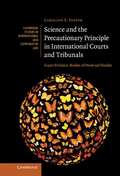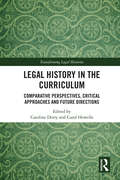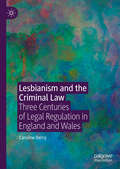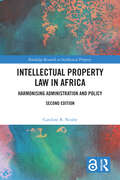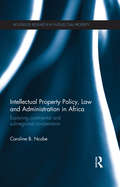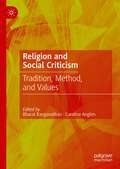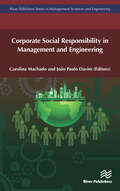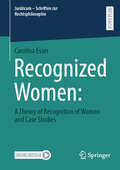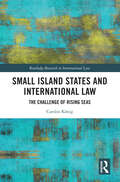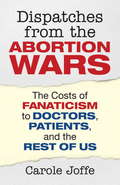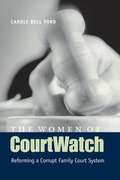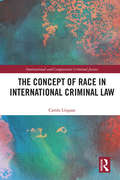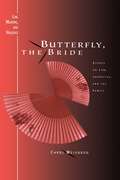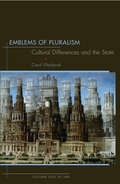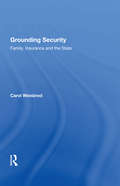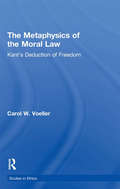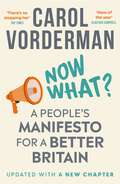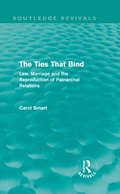- Table View
- List View
Science and the Precautionary Principle in International Courts and Tribunals
by Caroline E. FosterBy canvassing a range of international scientific disputes, including the EC-Biotech and EC-Hormones disputes in the WTO, the Case concerning Pulp Mills and the Gabcíkovo-Nagymaros case in the International Court of Justice, and the Mox Plant and Land Reclamation cases dealt with under the United Nations Convention on the Law of the Sea, Caroline Foster examines how the precautionary principle can be accommodated within the rules about proof and evidence and advises on the boundary emerging between the roles of experts and tribunals. A new form of reassessment proceedings for use in exceptional cases is proposed. Breaking new ground, this book seeks to advance international adjudicatory practice by contextualising developments in the taking of expert evidence and analysing the justification of and potential techniques for a precautionary reversal of the burden of proof, as well as methods for dealing with important scientific discoveries subsequent to judgments and awards.
Legal History in the Curriculum: Comparative Perspectives, Critical Approaches and Future Directions (Transforming Legal Histories)
by Caroline Derry Carol HowellsAs legal education faces fresh challenges and opportunities, and a growing literature calls for subversive new approaches, this book engages with vital questions about the place of history in the law school. How and why should we teach legal history? What is its place in the curriculum? What can different jurisdictions learn from each other? This collection offers an overview and examples of cutting-edge practice in teaching legal history across the law curriculum, challenging expectations of its place and potential. The book’s three sections explore practices and possibilities in the core curriculum, in dedicated legal history courses and in law schools across the world. They highlight how legal history offers diverse and inclusive content, global perspectives, and transnational understandings to students. By exploring contributors’ own purposes and practices, they provide insight and fresh ideas on how and why readers can incorporate legal histories into their own teaching.The volume will be an invaluable resource for all those involved in the teaching of law and the law school curriculum.
Lesbianism and the Criminal Law: Three Centuries of Legal Regulation in England and Wales
by Caroline DerryThis book offers a comprehensive examination of the ways in which the criminal justice system of England and Wales has regulated, and failed or refused to regulate, lesbianism. It identifies the overarching approach as one of silencing: lesbianism has not only been ignored or regarded as unimaginable, but was deliberately excluded from legal discourses. A series of case studies ranging from 1746 to 2013 from parliamentary debates to individual prosecutions shed light on the complex process of regulation through silencing. They illuminate its evolution over three centuries and explore when and why it has been breached. The answers Derry uncovers can be fully understood only in the context of surrounding social and legal developments which are also considered. Lesbianism and the Criminal Law makes an important contribution to the growing bodies of literature on feminism, sexuality and the law and the legal history of sexual offences.
A Proper Sense of Honor: Service and Sacrifice in George Washington's Army
by Caroline CoxStarting with the decision by patriot leaders to create a corps of officers who were gentlemen and a body of soldiers who were not, Caroline Cox examines the great gap that existed in the conditions of service of soldiers and officers in the Continental army.
Intellectual Property Law in Africa: Harmonising Administration and Policy (Routledge Research in Intellectual Property)
by Caroline B. NcubeExamining the harmonisation of Intellectual Property policy, law and administration in Africa, this book evaluates the effectiveness of efforts to establish continental Intellectual Property institutions and frameworks. It also considers sub-regional initiatives led by the regional economic communities and the regional Intellectual Property organisations, focusing on relevant protocols and agreements that address Intellectual Property as well as the implementing institutions. The book assesses the progress of such initiatives with particular reference to the current socio-economic status of African states. It argues that that harmonisation initiatives need to be crafted in a way that is supportive of the developmental goals of African states and advocates for due consideration of individual states’ unique conditions and aspirations. This book will be of great relevance to scholars and policy makers with an interest in Intellectual Property law and its harmonisation in Africa.
Intellectual Property Policy, Law and Administration in Africa: Exploring Continental and Sub-regional Co-operation (Routledge Research in Intellectual Property)
by Caroline B. NcubeThis book examines the harmonisation of Intellectual Property (IP) policy, law and administration in Africa. Two recent developments have brought this topic to the fore. The first is the escalation of long-standing efforts to establish a Pan-African Intellectual Property Organisation (PAIPO), a continental initiative. The second is the current sub-regional attempt to operationalise the IP provisions of the Southern African Development Community (SADC)’s Protocol on Trade (articles 9b and 24) and its Protocol on Science, Technology and Innovation (article 2m). Intellectual Property Policy, Law and Administration in Africa discusses the viability of such initiatives with particular reference to the current socio-economic status of Africa’s nations. With a view to contributing to future developments in Africa at both a continental and sub-regional level, the author considers this issue through the lens of advancing the public interest in IP. Ncube argues that harmonisation initiatives ought to be crafted in a way that is supportive of the development aspirations of African states. Consequently, she urges due consideration of individual states’ unique conditions and aspirations in any harmonisation venture, a necessity outlined in article 7 of the Agreement on Trade Related Aspects of Intellectual Property Rights. This book will be of great relevance to scholars and policy makers with an interest in IP law and African law in general.
Religion and Social Criticism: Tradition, Method, and Values
by Bharat Ranganathan Caroline AnglimThis volume brings together emerging and established religious ethicists to investigate how those in the field carry forward the practice and tradition of social criticism and, at the same time, how social criticism informs the scholarly values of their field. Contributors reflect on the nature of the moral subject and the ethical weight of human dignity and consider the limits and possibilities of religious humanism in orienting the work of social criticism. They compare religious sources and forms of research in religious ethics to secular sources and the tradition of liberal social criticism. And they offer proposals for how religious ethics can help humanists navigate our complex and multicultural moral landscape and what this field reveals about the ultimate ends of humanistic scholarship.
Corporate Social Responsibility in Management and Engineering
by Carolina Machado; João Paulo DavimReferring to an organizations responsibility for their impact on society, corporate social responsibility (CSR) is greatly relevant for the competitiveness, sustainability and innovation in the management and engineering arena of organizations, and the economy worldwide. Taking in account its these concerns, Corporate Social Responsibility in Management and Engineering covers the issues related to corporate social responsibility in management and engineering in a context where organizations are facing, day after day, high challenges for what concerns issues related to their social responsibility. The book looks to contribute to the exchange of experiences and perspectives about the state of the research related to CSR, as well as the future direction of this field of research. It looks to provide a support to academics and researchers, as well as those that operating in the management field need to deal with policies and strategies related to CSR.
Recognized Women: a theory of recognition of women and case studies (Juridicum - Schriften zur Rechtsphilosophie)
by Carolina EsserAxel Honneth’s theory of recognition comes from a theoretical paradigm attached to Western deliberative democracy. Honneth does not interpret recognition from the perspective of gender equality and how a woman may be recognized in non democratic and non Western societies. If one interprets the theory of recognition with a focus on the situation of women, it is possible to identify that legal recognition plays a fundamental role. It is relevant, then, to propose forms of struggling for the recognition of these women. It is adopted the methodology of Critical Theory and recognition is illustrated from the perspectives of case studies, for instance, regarding women in China and Morocco. In these countries, there are different forms of disrespect. Nevertheless, despite restrictions imposed by government and culture, both countries still have forms of struggling for recognition that should be perceived. Several forms of struggling for recognition, to turn recognition into a universal institute, which can be applied in different contexts. There are always forms of struggling for better conditions of women’s recognition in every community, through the support of law.
Small Island States & International Law: The Challenge of Rising Seas (Routledge Research in International Law)
by Carolin KönigWhat happens under international law if a state perishes due to rising sea levels without a successor state being created? Will the state cease to exist? What would this mean for its population? Have international law and globalization progressed enough to protect the people thus affected, or does international law still depend on the territorial state when it comes to protecting entire populations? Exploring these issues, this book provides answers to these pressing questions. Focusing on small island states as actors in the international community, it evaluates the challenges that the state as a subject of international law faces in general from globalization and humanization, and what this means for small island states threatened by rising seas. Highlighting the experience of the indigenous peoples of small island states as collectives, and to the individuals living in these states, the book addresses fundamental questions of general state theory and international law, drawing on an extensive body of source material. As rising sea levels present an increasingly pressing threat to small island states, this book highlights the importance of international protection of the individual and the capacity of international organizations to act within existing international law. It identifies pressing problems where immediate action is required and argues that, in future, the responsibility for protecting individuals could shift to the international community, if a sinking island state can no longer protect its population on its own.
Votes and More for Women: Suffrage and After in Connecticut
by Carole NicholsThis fascinating book demonstrates the diversity of Connecticut’s women’s feminist activities in pre- and post-suffrage eras and refutes the notion that feminist activism died out with the passage of the Nineteenth Amendment.
A Touch of Notoriety: The Most Coveted Prize The Power Of Vasilii A Touch Of Notoriety A Taste Of The Forbidden (Buenos Aires Nights #2)
by Carole MortimerAn Entertainment Weekly Top 10 Romance AuthorRules are made to be brokenBeth Blake used to have a perfectly normal life in London until a secret from the past thrusts her into notoriety and she finds herself in Argentina under thewatchful eye of a bodyguard. Controlling, insufferable and sinfully sexy to boot, Raphael Cordoba is a thorn in her independent side!Guarding Beth should be easy for Raphael—as longas he remembers the golden rule: do not touch the client, especially when she's the sister of your best friend! But feisty Beth requires a particular attentiveness that brings the illicit temptation of her even closer….
Dispatches from the Abortion Wars
by Carole JoffeSurprising firsthand accounts from the front lines of abortion provision reveal the persistent cultural, political, and economic hurdles to access More than thirty-five years after women won the right to legal abortion, most people do not realize how inaccessible it has become. In these pages, reproductive-health researcher Carole Joffe shows how a pervasive stigma--cultivated by the religious right--operates to maintain barriers to access by shaming women and marginalizing abortion providers. Through compelling testimony from doctors, health-care workers, and patients, Joffe reports the lived experiences behind the polemics, while also offering hope for a more compassionate standard of women's health care. From the Trade Paperback edition.
The Women of CourtWatch: Reforming a Corrupt Family Court System
by Carole Bell FordHouston was a terrible place to divorce or seek child custody in the 1980s and early 1990s. Family court judges routinely rendered verdicts that damaged the interests of women and children. In some especially shocking cases, they even granted custody to fathers who had been accused of molesting their own children. Yet despite persistent allegations of cronyism, incompetence, sexism, racism, bribery, and fraud, the judges wielded such political power and influence that removing them seemed all but impossible. The family court system was clearly broken, but there appeared to be no way to fix it.
The Concept of Race in International Criminal Law (International and Comparative Criminal Justice)
by Carola LingaasMembers of racial groups are protected under international law against genocide, persecution, and apartheid. But what is race – and why was this contentious term not discussed when drafting the Statute of the International Criminal Court? Although the law uses this term, is it legitimate to talk about race today, let alone convict anyone for committing a crime against a racial group? This book is the first comprehensive study of the concept of race in international criminal law. It explores the theoretical underpinnings for the crimes of genocide, apartheid, and persecution, and analyses all the relevant legal instruments, case law, and scholarship. It exposes how the international criminal tribunals have largely circumvented the topic of race, and how incoherent jurisprudence has resulted in inconsistent protection. The book provides important new interpretations of a problematic concept by subjecting it to a multifaceted and interdisciplinary analysis. The study argues that race in international criminal law should be constructed according to the perpetrator's perception of the victims’ ostensible racial otherness. The perpetrator’s imagination as manifested through his behaviour defines the victims’ racial group membership. It will be of interest to students and practitioners of international criminal law, as well as those studying genocide, apartheid, and race in domestic and international law.
Inside the Law: Canadian Law Firms in Historical Perspective
by Carol WiltonLaw firms are important economic institutions in this country: they collect hundreds of millions of dollars annually in fees, they order the affairs of businesses and of many government agencies, and their members include some of the most influential Canadians. Some firms have a history stretching back nearly two hundred years, and many are over a century old. Yet the history of law firms in Canada has remained largely unknown. This collection of essays, Volume VII in the Osgoode Society's series of Essays in the History of Canadian Law, is the first focused study of a variety of law firms and how they have evolved over a century and a half, from the golden age of the sole practitioner in the pre-industrial era to the recent rise of the mega-firm. The volume as a whole is an exploration of the impact of economic and social change on law-firm culture and organization. The introduction by Carol Wilton provides a chronological overview of Canadian law-firm evolution and emphasizes the distinctiveness of Canadian law-firm history.
Butterfly, the Bride: Essays on Law, Narrative, and the Family
by Carol WeisbrodCarol Weisbrod uses a variety of stories to raise important questions about how society, through law, defines relationships in the family. Beginning with a story most familiar from the opera Madame Butterfly, Weisbrod addresses issues such as marriage, divorce, parent-child relations and abuses, and non-marital intimate contact. Each chapter works with fiction or narratives inspired by biography or myth, ranging from the Book of Esther to the stories of Kafka. Weisbrod frames the book with running commentary on variations of the Madame Butterfly story, showing the ways in which fiction better expresses the complexities of intimate lives than does the language of the law. Butterfly, the Bride looks at law from the outside, using narrative to provide a fresh perspective on the issues of law and social structure---and individual responses to law. This book thoroughly explores relationships between inner and public lives by examining what is ordinarily classified as the sphere of private life---the world of family relationships.
Emblems of Pluralism: Cultural Differences and the State (The Cultural Lives of Law)
by Carol WeisbrodFrom outlawing polygamy and mandating public education to protecting the rights of minorities, the framing of group life by the state has been a subject of considerable interest and controversy throughout the history of the United States. The subject continues to be important in many countries. This book deals with state responses to cultural difference through the examination of a number of encounters between individuals, groups, and the state, in the United States and elsewhere. The book opens the concepts of groups and the state, arguing for the complexity of their relations and interpenetrations. Carol Weisbrod draws on richly diverse historical and cultural material to explore various structures that have been seen as appropriate for adjusting relations between states and internal groups. She considers the experience of the Mormons, the Amish, and Native Americans in the United States, the Mennonites in Germany, and the Jews in Russia to illustrate arrangements and accommodations in different times and places. The Minorities Treaties of the League of Nations, political federalism, religious exemptions, nonstate schools, and rules about adoption are among the mechanisms discussed that sustain cultural difference and create frameworks for group life, and, finally, individual life. At bottom, Emblems of Pluralism concerns not only relations between the state and groups, public and private, but also issues of identity and relations between the self and others.
Grounding Security: Family, Insurance and the State (Law, Justice And Power Ser.)
by Carol WeisbrodThis book examines some of the mechanisms which are currently conceived as affording individual security. The idea of security includes emotional and financial components. These interconnect so that such common concepts as 'trust' in someone and 'care taking' include both ideas of emotional and financial support. State policies on security rest on perceptions of two other institutions, the family and insurance, both of which are subject to change. At one time the extended family was seen as a major security-providing institution, but the contemporary nuclear family is more fragile. The concept of insurance originally entailed ideas of community and mutual aid; however, the institution has developed, in its modern private form, as a profit-driven entity. This book addresses various uses of state power in providing security for individuals, and outlines different ways in which this can be done.
The Metaphysics of the Moral Law: Kant's Deduction of Freedom (Studies in Ethics)
by Carol W. VoellerThis work offers a new understanding of Kant on the freedom of the will. Voeller looks in detail at the Groundwork of the Metaphysics of Morals and the Critique of Practical Reason against the background of Kant's critical philosophy as a whole.
Now What?: On a Mission to Fix Broken Britain
by Carol VordermanPolitics: The three vowels and five consonants which control our world.'But what has politics got to do with me?' I hear you ask. Well, quite a lot really. Whether you like it or not, it affects every single thing in your life from the moment you wake up in the morning until you crawl into bed at night.But some of our political elite make it feel like a club which we have not been invited to join. The privileged few who want to keep it all for the privileged few. I hope this book can explain much, make you laugh out loud and make you realise that together our voices are powerful.Buckle up and come on a political rollercoaster with me - 'an old bird with an iPhone'. This is a book for people who don't normally think about politics. We have a new government and have bid a loud goodbye to the Tories, but the issues that allowed the last government to mismanage and deceive us for so long lie deep. Amidst a landscape of economic turmoil and deepening societal fractures, we need to see a new age of accountability in our political system.With her characteristic outspokenness and irrepressible sense of humour, in Now What? On a Mission to Fix Broken Britain, Carol Vorderman exposes the intricate web of influence responsible for our nation's unravelling and provides us with a toolkit for building a better and fairer Britain.Part diary, part manifesto, part journey down the rabbit hole of British politics, this is the story of how 'an old bird with an iPhone' exposed the incompetence and lies of the establishment, and inspired countless others to find their voice and stand up for what they believe in.
Now What?: On a Mission to Fix Broken Britain
by Carol VordermanPolitics: The three vowels and five consonants which control our world.'But what has politics got to do with me?' I hear you ask. Well, quite a lot really. Whether you like it or not, it affects every single thing in your life from the moment you wake up in the morning until you crawl into bed at night.But some of our political elite make it feel like a club which we have not been invited to join. The privileged few who want to keep it all for the privileged few. I hope this book can explain much, make you laugh out loud and make you realise that together our voices are powerful.Buckle up and come on a political rollercoaster with me - 'an old bird with an iPhone'. This is a book for people who don't normally think about politics. We have a new government and have bid a loud goodbye to the Tories, but the issues that allowed the last government to mismanage and deceive us for so long lie deep. Amidst a landscape of economic turmoil and deepening societal fractures, we need to see a new age of accountability in our political system.With her characteristic outspokenness and irrepressible sense of humour, in Now What? On a Mission to Fix Broken Britain, Carol Vorderman exposes the intricate web of influence responsible for our nation's unravelling and provides us with a toolkit for building a better and fairer Britain.Part diary, part manifesto, part journey down the rabbit hole of British politics, this is the story of how 'an old bird with an iPhone' exposed the incompetence and lies of the establishment, and inspired countless others to find their voice and stand up for what they believe in.
Now What?: On a Mission to Fix Broken Britain
by Carol VordermanPolitics: The three vowels and five consonants which control our world.'But what has politics got to do with me?' I hear you ask. Well, quite a lot really. Whether you like it or not, it affects every single thing in your life from the moment you wake up in the morning until you crawl into bed at night.But some of our political elite make it feel like a club which we have not been invited to join. The privileged few who want to keep it all for the privileged few. I hope this book can explain much, make you laugh out loud and make you realise that together our voices are powerful.Buckle up and come on a political rollercoaster with me - 'an old bird with an iPhone'. This is a book for people who don't normally think about politics. We have a new government and have bid a loud goodbye to the Tories, but the issues that allowed the last government to mismanage and deceive us for so long lie deep. Amidst a landscape of economic turmoil and deepening societal fractures, we need to see a new age of accountability in our political system.With her characteristic outspokenness and irrepressible sense of humour, in Now What? On a Mission to Fix Broken Britain, Carol Vorderman exposes the intricate web of influence responsible for our nation's unravelling and provides us with a toolkit for building a better and fairer Britain.Part diary, part manifesto, part journey down the rabbit hole of British politics, this is the story of how 'an old bird with an iPhone' exposed the incompetence and lies of the establishment, and inspired countless others to find their voice and stand up for what they believe in.
The Ties That Bind: Law, Marriage and the Reproduction of Patriarchal Relations (Routledge Revivals)
by Carol SmartFirst published in 1984, this book made an important and timely contribution to the development of the idea that the law is a major source of women’s oppression. Based on research of the theory and practice of family law, it examines the way in which private law operates to sustain, reproduce and reinforce the dependence of women in the most private of spheres, namely marriage. The author focuses on the point of break down or divorce, where the economic vulnerability of women caused by marriage and the sexual division of labour is most clearly expressed. She points to the way in which the law, while mitigating the worst excesses of men’s power over women in marriage, has consistently failed to tackle the economic structure of marriage and women’s fundamental material vulnerability inside the family. She confronts various myths on divorce legislation in Britain and discusses alternative feminist proposals for tackling the problems caused by women’s economic dependence in marriage. Although Smart writes in 1984, many of the issues she discusses retain their significance in today’s society.
About Abortion: Terminating Pregnancy in Twenty-First Century America
by Carol SangerNew medical technologies, women’s willingness to talk online and off, and tighter judicial reins on state legislatures are shaking up the practice of abortion. As talk becomes more transparent, Carol Sanger writes, women’s decisions about whether to become mothers will be treated more like those of other adults making significant personal choices.
